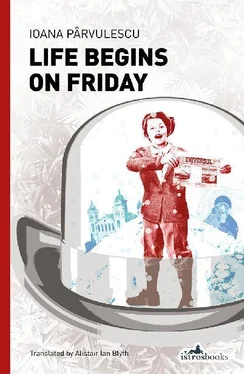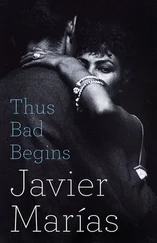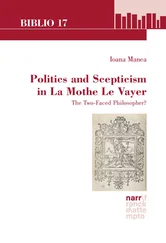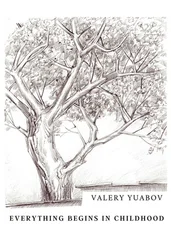At the magazine, Dan had celebrated Christmas a few days in advance, as usual. On the big calendar, which had bold numbers, without any photographs, somebody had moved the red square ahead a week. The whole staff lived to a weekly rhythm, as if somebody moved them seven days at a time, from one window on the calendar to another. The red square on the calendar now framed a Monday: 19 December. Dan Crețu had quickly entered the office, shaking the snow off his coloured footwear. As always, he was late.
He looked around him without curiosity: women and men who did not particularly care about each other. The editor-in-chief was leafing through a science magazine with the Eiffel Tower on the cover. Pavel, a young man with round glasses, was speaking softly to a woman and his mind was elsewhere. The administrator entered, whose voice, by contrast, was loud and melodious, as if he were on stage. In any case, there were few of them. Some were playing truant and for a few moments Dan envied them. People were dressed somewhat smarter than on ordinary days, but the slush on the streets did not encourage fanciful outfits. From waist level upward he could see thin, tightly-fitting blouses, cleavages on display, cheap necklaces and long earrings, or depending on the person, shirts and thick jackets, even a necktie, but at floor level everything was the same, for both the men and the women: blue or black trousers without stripes, comfortable boots, which left muddy prints on the parquet, of different sizes and sole patterns. And then there was Dan’s footwear, which rather stood out. A few editors, proof-readers and people from the printing press had gathered, without enthusiasm, the same as at every work party. They didn’t even have a Christmas tree; they were making economies. The soft transparent plates and cups would later be thrown in the bin. Dan saw a yellowing newspaper, an old Universul , bought from some second-hand bookshop, which Pavel had brought to show his colleagues. He cast a glance at the front page, which featured a questionnaire on the topic Why Do You Fast? and for a second he was amazed to see that somebody signed it whose name was almost the same as his: Dan Kretzu.
Ever since he had crossed the psychological threshold of the twenty-first century, Dan had ceased to be interested in Christmas trees, New Year and parties. Few things aroused his curiosity any longer. He lived, constantly weary, in a murky present. In any event, it was the worst period of the year for him, in which time had become the single gift of joy that you could give to anyone. Dan was forty-three and life had quite simply passed him by. He had a great need of time.
. . . . . . . . . . . . . . . . . . . . . . .
Publisher Socec Fils put the manuscript down, he took off his pince-nez, and in large violet letters wrote: NO. It was the first manuscript he had rejected since his father’s death.
Today Strada Fântânei (Fountain Street) is called Berthelot and leads to Romanian Radio Broadcasting headquarters.
Strada Sfântul Ionică, which once ran behind the National Theatre, has vanished, likewise Romanian Passage and the Theatre itself. On the site now stands a hotel, which features a replica of the entrance portico of what was once Bucharest’s most famous building.
Strada Teilor (Lindens Street) is now called Vasile Lascăr.
Right next to the old Universul newspaper building — a two-storey rococo house — a five-storey building with a peaked roof was constructed, into which the newspaper offices moved in the inter-bellum. On the ground floor of the old building there is now a Romanian restaurant, not one of whose customers seems to know about the people who once published a famous gazette here. But on the threshold there still remains the stone inscription in large letters: UNIVERSUL .
In Bucharest, Luigi Cazzavillan has a street and a belle époque park named after him. In the park he has a statue.
On the site of the Sărindar Monastery was built the magnificent Military Club, before the First World War. There is a fountain on the spot where the altar once stood. The icon of the Mother of God with diamonds on her shoulders was never found and it is supposed to have been taken abroad. Somewhere in the world, unbeknown, the diamonds glitter even today.
Sub-lieutenant N. I. Popescu-Lumină died in Bucharest in 1939. He reached the rank of colonel. In the inter-bellum, he wrote a column for Universul titled ‘From Days Gone By’.
Strada Sărindar is now called Constantin Mille, after the director of Adevĕrul . After 1898, when Alexandru Beldiman, the Gazette’s founder, died, Mille became synonymous with the newspaper whose owner he had long since become. Between the wars, every cinema on the Elisabeta Boulevard had an ‘Exit via Sărindar.’
For the slaying in a duel of George Em. Lahovary, the director of the French-language L’Indépendance Roumaine , Nicu Filipescu, former mayor of Bucharest and director of the Epoca newspaper, was sentenced to six months imprisonment in Văcărești. This did not dent his renown, nor did it affect his seemingly spotless subsequent political career.
General Algiu served as the Prefect of Police one more year, in 1901, the first year of the twentieth century.
Mr Costache took care to erase his name from the documents. He always suspected Dan Crețu of being an undiscovered criminal, but at the same time he was sure he was not a dangerous man.
At the Athenaeum in 1898 Dr Dimitrie Gerota gave his promised lecture on the need to do away with corsets and the Margulis family were among the audience. At the School of Fine Arts one of his students was Constantin Brancusi, who under his guidance made the cast entitled ‘Flayed Man.’ Gerota is considered to have been the first Romanian radiologist. He founded a hospital and a museum of anatomical casts. Even today, in departments of surgery and urology and in anatomy classes in France, Germany and Tokyo ‘Gerota’s fascia’ and ‘Gerota’s capsule’ are terms still current.
In 1906, Jacques, having reached the age of twenty-one, read to Nicu the following sentence, translating from the Spanish, which was his latest passion: ‘In fact they wanted both lives at once, and man wants all worlds and all centuries and to live in the whole of space and the whole of time, infinitely and eternally.’ It was the essence of the century in which both had been born and explains the feeling that gripped the folk of Bucharest on the arrival of a stranger, who seemed to know more about time than they did. ‘Who’s it by?’ asked Nicu, and Jacques replied: ‘Nobody has heard of him, a Spaniard, Miguel de Unamuno.’
Niculae Stanciu was one of the first young men in Bucharest to obtain a pilot’s licence and in the First World War he flew fighter aeroplanes. He was killed in action and was posthumously awarded the Courage and Faith Medal with swords.
The Handel minuet was later transposed for piano by Wilhelm Kempff, and Idil Biret was the pianist who lent it its strangest velvetiness.
Having made a two-year hiatus in the Great War, Universul continued to be published until 1953, when the Communists abolished it, along with every other symbol of the old world.
Pavel Mirto’s novel The Future Begins on Monday was not published. Publisher Socec Fils was irritated by its description of unimaginable ladies’ clothing, not to mention the notion of soft plates and cups, to be discarded after use. And all the rest.
1897 (from contemporary periodicals)
The Orthodox calendar for 1897
St Basil the Great — 1 January
Читать дальше












